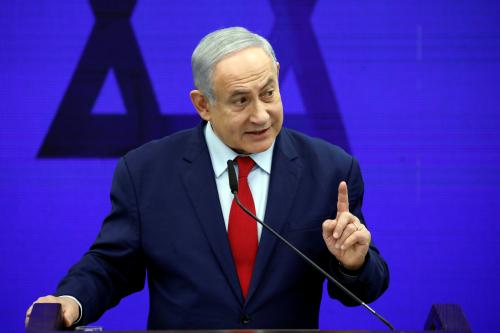Israeli Prime Minister Benjamin Netanyahu is a leader who portrays himself as one of the persecuted, the target of an incessant witch-hunt by the so-called deep state, writes Natan Sachs. This post originally appeared in The Atlantic.
A leader who portrays himself as one of the persecuted, the target of an incessant witch-hunt by the so-called deep state. A liberal media intent on revisiting an election gone badly. And a left-wing political machine supposedly out to get him. This leader, of course, is Benjamin Netanyahu, prime minister of Israel.
On August 4, Netanyahu’s former chief of staff signed a deal with the Israeli police to become a state’s witness in two criminal investigations in which the prime minister is a suspect. One of the cases involves gifts from billionaires abroad; the other concerns an alleged attempt to negotiate favorable press coverage. Three other investigations involve people close to Netanyahu: his lawyer (a second cousin), a political appointee, and even his wife, Sara. Netanyahu has not been indicted by the attorney general, let alone convicted by a criminal court—that could take months.
And yet, things don’t look good for Bibi, as the leak-happy Hebrew press keeps reporting. The state’s witness, Ari Harow, must provide the goods if he himself is to avoid a prison sentence for suspected bribery and fraud; few know more about Netanyahu’s dealings than him. Netanyahu’s many rivals at home, both within and outside his own Likud party and coalition, have long been preparing for the end of his tenure. Now, they smell political blood.
Netanyahu’s response has been one of defiance. On August 9, Likud party officials and supporters—the Bibi faithful—gathered at a rally in Tel Aviv to voice their support for the prime minister. There, he delivered a message of persecution, railing against the despised liberal media and the even-more despised left-wing. The two, he said, are one and the same. They had failed to beat him at the polls, and were now out to get him by other means, which that amorphous elite—the left-wing, the media—presumably control. Never mind that the attorney general, who holds sole discretionary power to indict him, is a Netanyahu appointee and certainly no lefty, or that his rival and predecessor, Ehud Olmert, just left prison, where he spent nearly 18 months after being convicted on charges similar to those Bibi now faces.
At the rally, Netanyahu seemed to channel Donald Trump. He even explicitly (mis)used the English phrase “fake news” to attack the supposedly biased mainstream media that’s out to get him. While Netanyahu and Trump are profoundly different—Bibi’s many faults aside, he is erudite, cautious, and experienced—the two men share an approach to confronting political adversity: divide and conquer, turn the spotlight on the “other,” create an other when none is available, and always, always, feed the base.
Therein lies a long-term danger for both Israel and America. The governing institutions of each are strong, but their leaders have the power to shape or erode basic norms of democracy and codes of national unity; both Netanyahu and Trump have been careless at best in this regard. Faced with a real threat to his position, perhaps even to his liberty, Netanyahu is once again playing with fire.
Netanyahu’s performance at that Likud gathering was vintage Bibi, recalling his first run for prime minister in the 1990s. Back then, Netanyahu led the opposition to Prime Minister Yitzhak Rabin of the Labor Party, as a vicious public campaign against him swept through Israel’s right-wing. After his assassination by a right-winger, Netanyahu defeated Rabin’s successor, Shimon Peres, to become Israel’s youngest-ever prime minister. In Netanyahu’s mind, the same elite he now attacks—the media, the left-wing, the supposed deep state—never forgave him, blaming him for the incitement against Rabin, and for daring to defeat Peres fair and square. They never accepted this outsider who was raised partly in America, who had never been a minister (he had been a deputy minister), and who had never been part of any of the main cliques of the Israeli elite.
Netanyahu’s paranoia was not entirely unwarranted. On the morning after his first electoral victory in May 1996, for example, a mere six months after Rabin’s assassination, signs lamenting that “Rabin was assassinated twice”—equating his win to the prime minister’s death—adorned signposts on the streets of Tel Aviv. Many Rabin-Peres supporters never got over Netanyahu’s victory. (They were also appalled by many of his subsequent policies.) Yet there was also political opportunity for Netanyahu in that narrative, which he exploited.
The “old elites,” a phrase that gained currency in Israel during Netanyahu’s first term, were the bogeymen for the disparate parts of his political base: the Mizrahim, the ultra-orthodox Jews, the National-Religious, the Russian-speaking immigrants from the former Soviet Union. They shared little except their antagonism to Israel’s perceived elite, the left-wing and largely secular Ashkenazi Jews of Israel. As Menachem Begin did 1977, Netanyahu, an Ashkenazi Jew, enlisted the votes of these “left-behinds,” sometimes called “second Israel,” to the political cause of the (Ashkenazi) right-wing. Almost every segment of Jewish-Israeli society that felt disenfranchised opposed the hated establishment, leaving only Israel’s Arab citizens aligned with the left.
For Netanyahu, catering to the base also came with political risk. Many in the Israeli political center were taken aback by his tone when, for example, he was caught on camera whispering into the ear of an octogenarian rabbi influential among religious Mizrahi voters that the left had “forgotten what it means to be Jewish.” Many voters in the center—not leftist themselves—disliked such tactics. Netanyahu was routed in the elections of 1999 in no small part because of a sense of fatigue with the partisanship of his first term. Like in the United States, a base offers loyalty and energy, but not always sufficient numbers.
At the same time, Netanyahu’s choice to voice the legitimate, sometimes-justified concerns of those who felt left behind had important benefits for Israeli society, in the symbolic realm at least. Mizrahi culture and heritage, for example, received more recognition and airtime in mainstream media.
In the United States, too, one lesson of Trump’s rise is that its ruling elite need to take a hard look at the many Americans alienated by the current power structures. It may have been high time for Washington to be shocked by its disconnect from much of the country. But without a leader able to transform grievance into empowerment and political victory into responsibility and ownership, the disconnect will only widen.
In the end, Netanyahu failed to transform his victory into a cathartic experience for the groups he claimed to elevate; he never stopped campaigning as the antithesis to the hated elite. The never-ending, cynical invocation of the political base’s grievances—something Netanyahu and others have now perfected—had severe consequences for Israeli society and politics. Even as he secured political power, Netanyahu preferred to play the role of leader of the opposition, to perpetuate a sense of victimhood among his supporters rather than transform his numerous political victories into agency, empowerment and, above all, responsibility.
Today, Netanyahu’s gamble of catering to the base while neglecting the center is less risky than it was in the 1990s, as the Israeli right-wing has expanded. Hasmol, or “the left” in Hebrew, is now often used as a pejorative phrase. Rabin’s Oslo peace process, and the left as a political camp, were decimated by the Second Intifada, which began in the summer of 2000. The political center of Ariel Sharon and Olmert, which pushed for unilateral separation from the Palestinians, was rebuffed in Israeli voters’ eyes by the rockets that followed the disengagement from Gaza in 2005. It has now been 40 years since the rise of the Likud party of Begin and Netanyahu. Over that time, Labor, the once-hegemonic party of Israeli politics, has held the prime ministership for less than eight years (the centrist Kadima held it for three more). The right-wing’s reign in Israel today is no temporary fluke.
And yet Likud still speaks as the underdog, as the opposition to a deep state and an amorphous elite. (That elite, incidentally, feels more besieged and marginalized than ever.) This thinking helps explain, at least in part, why in the last election in 2015, Netanyahu posted a video warning his supporters that foreign-funded NGOs were busing Arab voters in “droves” to polling stations—a false story, and reckless for Netanyahu, leader of a country where 20 percent of the citizenry is Arab, to disseminate.
The power of Netanyahu’s base does not mean he will evade legal trouble, however. The rule of law in Israel is strong. If the state prosecutor recommends indictment, the attorney general will then weigh the evidence and the chances of conviction, and likely grant Netanyahu a special hearing before any final decision to indict.
Netanyahu has hinted that he does not intend to resign even if indicted. He may even try to call for early elections in order to gain a popular mandate in the face of a legal decision. Yet if Bibi is indicted, he will likely eventually have to resign; polling suggests that even many right-wing voters expect him to do so.
After Netanyahu, the opposition would aim to capitalize on the scandals and seek to replace him. Yet the power of his base means that his replacement may well come from within his own camp. If he resigns, Likud might also maintain its coalition and simply appoint one of its own as prime minister, bypassing a general election.
If the right-wing prevails, Israel’s policies, including its stance toward the Palestinians, would remain largely unchanged. Yet a new prime minister, whether a hawk or a dove, would have a chance to change a central aspect of the Netanyahu legacy: the divisiveness of his politics. Even after over 11 years as prime minister, Netanyahu has, deliberately, never lost the appeal of an oppositional figure pitting himself against a hated establishment. In Israel, as in the United States, that is a dangerous approach to leadership.










Commentary
Benjamin Netanyahu and the politics of grievance
August 22, 2017